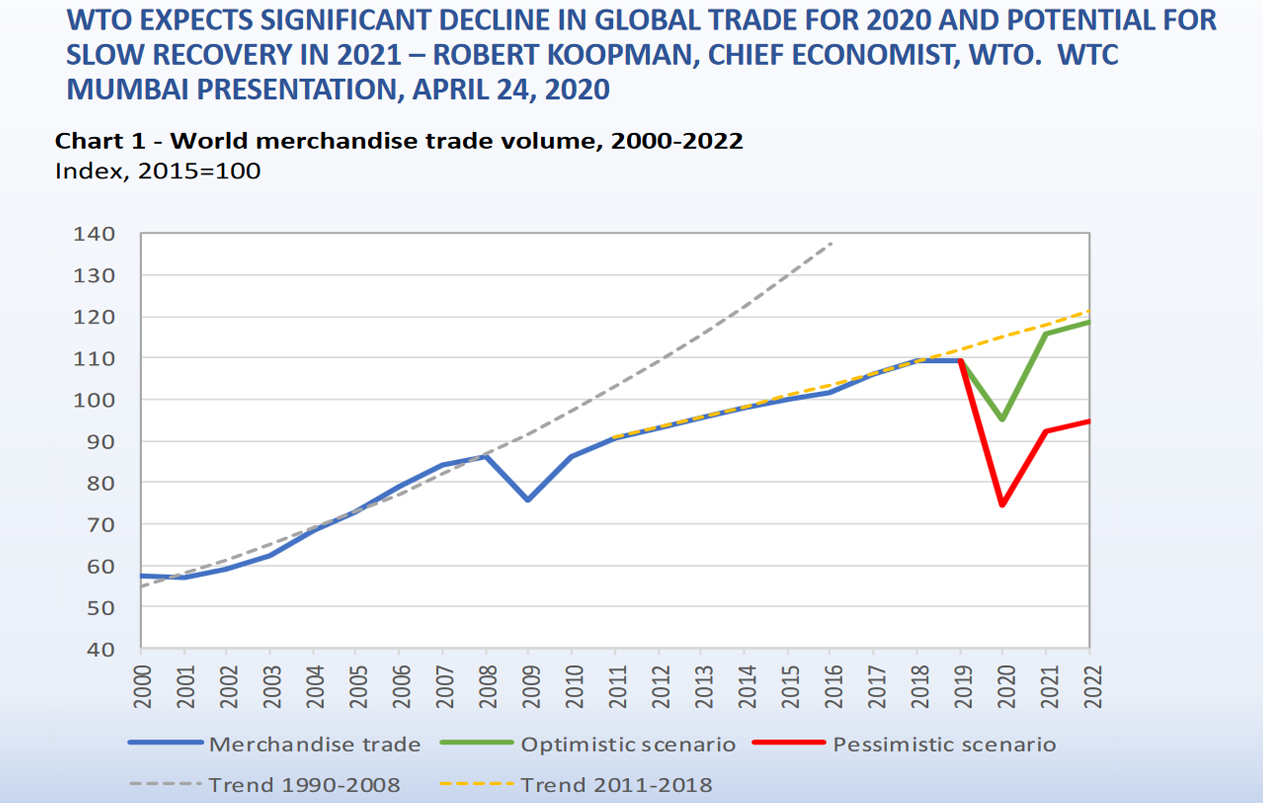COVID crisis to cause realignment of globalization, not de-globalisation, says Dr. Koopman
Maharashtra government to consider stimulus package for MSMEs
“COVID crisis will lead to realignment of globalisation rather than de-globalisation. The crisis will cause near-shoring and companies will diversify their supply chain away from China. Manufacturers will rethink just-in-time inventory and increase their inventory carry. Companies will also increasingly adopt digitization and automation,”
said Dr. Robert Koopman, Chief Economist and Director – Economic Research & Statistics Division, World Trade Organization while addressing a webinar on impact of COVID on trade and industry. The webinar was organized by MVIRDC World Trade Center Mumbai and All India Association of Industries (AIAI).
Dr. Koopman suggested that India should take proactive steps to benefit from the realignment of global supply chain in the post-COVID-19 period. In order to benefit from this global realignment, Dr. Koopman suggests Indian government to keep its supply chain moving, facilitate trade finance, attract FDI and support MSMEs.
WTO expects the COVID crisis to reduce India’s GDP growth by 5.4% from the expect growth of around 6% in 2020 under optimistic scenario. However, the economy is expected to recover in 2021 depending on the evolving scenario of the pandemic.
Dr. Koopman warned countries against taking protectionist measures as these actions will trigger retaliation from trade partners and hurt global investment. He informed that 80 countries have imposed export restrictions amidst COVID-19 crisis to increase domestic supply of medical goods.
Protectionist measures will increase cost of trading, which will in turn reduce world GDP growth and exports between 16-34% under various scenarios, Dr. Koopman warned. Trade cost in India has increased by 3.5% due to disruption in supply chain amidst this pandemic and increase in protectionist measures, Dr. Koopman informed.
Speaking on this occasion, Dr. Harshdeep Kamble, Development Commissioner (Industries), Government of Maharashtra informed that the state government is working on a stimulus package for micro, small and medium enterprises.
He said, “The state is working on providing interest subsidy and wage subsidy for initial two months to support investment from MSMEs. The state government is also working on further incentives for the textile sector. Also in the pipeline is the state government’s skill development programme in emerging sectors such as artificial intelligence, data science, e-commerce, fintech, cloud computing, information technology.”
Dr. Kamble also informed the steps being taken by the state to attract FDI. He said, “Government of Maharashtra is working on special package to attract MNCs looking to relocate from China in five focus sector, viz. automobiles, steel, textiles, agro processing and pharma sectors. The state government will conduct roadshows and market the state in different countries by November 2020 to attract investment. The Chinese company Great Wall Motors decided to go ahead with its investment in electric vehicle facility and battery production unit in Pune despite the COVID crisis.,”
He explained that Maharashtra has the best Industrial policy in India and it offers incentives on gross basis so that investors can recover upto 100% of their fixed investment.
The state government will promote domestic manufacturing of bulk drugs and chemicals used in Active Pharmaceutical Ingredients, he added. Already, the state has a sound manufacturing base in pharmaceuticals and it exports Rs. 1 lakh crore worth of drugs to the world market every year.
In the IT sector, the state is planning to develop Mumbai into a global hub for data center as lot of undersea cable passes through the Mumbai sea.
In order to promote employment generation in rural economy, Dr. Kamble said the state government will promote food processing sector and it has already provided Rs. 5 billion support package to farmers.
Speaking about the state’s exit strategy from COVID-19 lockdown, Dr. Kamble said, “Under the present circumstances 6500 units in Maharashtra have started operation in recent days and 4000 units have applied for resuming their operations. Maharashtra is supporting 3.2 lakh migrant labourers, 80% of whom are from other states, with food and other facilities. The state government is also providing financial support to 12 lakh construction workers.”
Dr. Sachchidanand Shukla, Chief Economist, Mahindra Group informed that India is the only country besides China to witness positive economic growth in 2020 despite COVID-19. He raised hope that Indian economy can recover well if right policy actions are taken to support industry and investment. He explained how Japan has moved proactively by setting up a USD 2.2 billion fund to facilitate relocation of its companies from China.
Speaking about the short-run impact of COVID-19 on Indian economy, Dr. Shukla said the crisis will affect discretionary consumption that accounts for USD 470 billion of our GDP.
Earlier in his welcome address Mr. Vijay Kalantri, Vice Chairman, MVIRDC World Trade Center Mumbai said, “There is great opportunity in the face of crisis and one should not get bogged down by the crisis itself. There is always a silver lining inspite of manufacturing contraction, economic slowdown and global recession. Government of Maharashtra should simplify regulatory procedures for investment in the proposed five manufacturing zones in automobiles, textiles, IT, agro, electronic hardware (including semiconductors).”
Mr. Kalantri suggested that these five manufacturing zones should be set up in the DMIC area and MIDC should monitor their implementation on war footing.
Mr. Kalantri further remarked that the state government’s target of USD one trillion economy is well within reach and India should not miss the bus and must do everything to capture the opportunity arising from the present crisis. India has already missed investment from 18 companies that relocated from China after the 2008 crisis”
Ms. Rupa Naik, Senior Director, MVIRDC World Trade Center Mumbai proposed the vote of thanks.

 : +91 7718886506
: +91 7718886506
